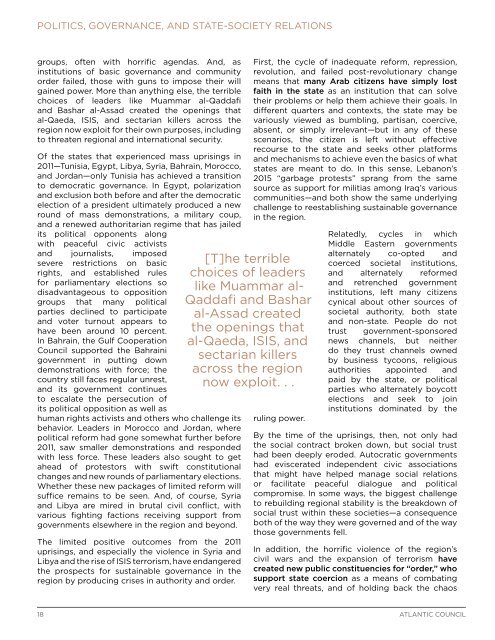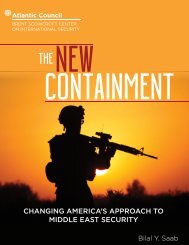POLITICS GOVERNANCE STATE-SOCIETY RELATIONS
Politics_Governance_and_State-Society_Relations_web_1121
Politics_Governance_and_State-Society_Relations_web_1121
Create successful ePaper yourself
Turn your PDF publications into a flip-book with our unique Google optimized e-Paper software.
<strong>POLITICS</strong>, <strong>GOVERNANCE</strong>, AND <strong>STATE</strong>-<strong>SOCIETY</strong> <strong>RELATIONS</strong><br />
groups, often with horrific agendas. And, as<br />
institutions of basic governance and community<br />
order failed, those with guns to impose their will<br />
gained power. More than anything else, the terrible<br />
choices of leaders like Muammar al-Qaddafi<br />
and Bashar al-Assad created the openings that<br />
al-Qaeda, ISIS, and sectarian killers across the<br />
region now exploit for their own purposes, including<br />
to threaten regional and international security.<br />
Of the states that experienced mass uprisings in<br />
2011—Tunisia, Egypt, Libya, Syria, Bahrain, Morocco,<br />
and Jordan—only Tunisia has achieved a transition<br />
to democratic governance. In Egypt, polarization<br />
and exclusion both before and after the democratic<br />
election of a president ultimately produced a new<br />
round of mass demonstrations, a military coup,<br />
and a renewed authoritarian regime that has jailed<br />
its political opponents along<br />
with peaceful civic activists<br />
and journalists, imposed<br />
severe restrictions on basic<br />
rights, and established rules<br />
for parliamentary elections so<br />
disadvantageous to opposition<br />
groups that many political<br />
parties declined to participate<br />
and voter turnout appears to<br />
have been around 10 percent.<br />
In Bahrain, the Gulf Cooperation<br />
Council supported the Bahraini<br />
government in putting down<br />
demonstrations with force; the<br />
country still faces regular unrest,<br />
and its government continues<br />
to escalate the persecution of<br />
its political opposition as well as<br />
human rights activists and others who challenge its<br />
behavior. Leaders in Morocco and Jordan, where<br />
political reform had gone somewhat further before<br />
2011, saw smaller demonstrations and responded<br />
with less force. These leaders also sought to get<br />
ahead of protestors with swift constitutional<br />
changes and new rounds of parliamentary elections.<br />
Whether these new packages of limited reform will<br />
suffice remains to be seen. And, of course, Syria<br />
and Libya are mired in brutal civil conflict, with<br />
various fighting factions receiving support from<br />
governments elsewhere in the region and beyond.<br />
The limited positive outcomes from the 2011<br />
uprisings, and especially the violence in Syria and<br />
Libya and the rise of ISIS terrorism, have endangered<br />
the prospects for sustainable governance in the<br />
region by producing crises in authority and order.<br />
[T]he terrible<br />
choices of leaders<br />
like Muammar al-<br />
Qaddafi and Bashar<br />
al-Assad created<br />
the openings that<br />
al-Qaeda, ISIS, and<br />
sectarian killers<br />
across the region<br />
now exploit. . .<br />
First, the cycle of inadequate reform, repression,<br />
revolution, and failed post-revolutionary change<br />
means that many Arab citizens have simply lost<br />
faith in the state as an institution that can solve<br />
their problems or help them achieve their goals. In<br />
different quarters and contexts, the state may be<br />
variously viewed as bumbling, partisan, coercive,<br />
absent, or simply irrelevant—but in any of these<br />
scenarios, the citizen is left without effective<br />
recourse to the state and seeks other platforms<br />
and mechanisms to achieve even the basics of what<br />
states are meant to do. In this sense, Lebanon’s<br />
2015 “garbage protests” sprang from the same<br />
source as support for militias among Iraq’s various<br />
communities—and both show the same underlying<br />
challenge to reestablishing sustainable governance<br />
in the region.<br />
ruling power.<br />
Relatedly, cycles in which<br />
Middle Eastern governments<br />
alternately co-opted and<br />
coerced societal institutions,<br />
and alternately reformed<br />
and retrenched government<br />
institutions, left many citizens<br />
cynical about other sources of<br />
societal authority, both state<br />
and non-state. People do not<br />
trust government-sponsored<br />
news channels, but neither<br />
do they trust channels owned<br />
by business tycoons, religious<br />
authorities appointed and<br />
paid by the state, or political<br />
parties who alternately boycott<br />
elections and seek to join<br />
institutions dominated by the<br />
By the time of the uprisings, then, not only had<br />
the social contract broken down, but social trust<br />
had been deeply eroded. Autocratic governments<br />
had eviscerated independent civic associations<br />
that might have helped manage social relations<br />
or facilitate peaceful dialogue and political<br />
compromise. In some ways, the biggest challenge<br />
to rebuilding regional stability is the breakdown of<br />
social trust within these societies—a consequence<br />
both of the way they were governed and of the way<br />
those governments fell.<br />
In addition, the horrific violence of the region’s<br />
civil wars and the expansion of terrorism have<br />
created new public constituencies for “order,” who<br />
support state coercion as a means of combating<br />
very real threats, and of holding back the chaos<br />
18 ATLANTIC COUNCIL



